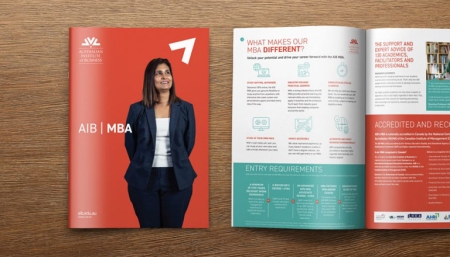David Mortimer AO brings a wealth of experience to AIB

David Mortimer AO has had a diverse and fascinating career spanning over 45 years. Now, he turns his hand to guest lecturing with AIB, sharing his knowledge and expertise in corporate governance. It’s hard to think of anyone more qualified to do so!
He comes on board as the former Chairman of Crescent Capital Partners, a position from which he is now retired. Crescent Capital Partners is a Sydney-based equity firm which invests in middle-market companies across Australia and New Zealand. Mr Mortimer was a founding Shareholder and Chairman until his retirement in December 2017.
Mr Mortimer graduated from the University of Sydney in the late 1960s with an Economics degree and first-class honours. He pursued a successful early career in banking and finance, and joined transport giant TNT Ltd in 1973. By 1992, he had worked his way up to Managing Director and CEO. He sold the company to the Dutch in 1997 and became Chairman of the Australia Pacific region until his resignation in 1998.
An impressive resume of board service and directorships followed. Mr Mortimer has been the Chairman of many organisations including several airports, the Defence Procurement Advisory Board, and Australia Post. He has also held numerous directorships, including the Australian Graduate School of Management. To this day he remains a member of the Board of Governors of the Committee for Economic Development of Australia (CEDA) and an Ambassador of the Australian Indigenous Education Foundation (AIEF).
In 2005, Mr Mortimer was appointed as an Officer of the Order of Australia, and in 2010, a Fellow of the Senate of the University of Sydney.
Mr Mortimer has also worked with the Federal Government on a number of high priority reviews. In November 1997, he undertook a review of business programs for the Federal Government known as The Mortimer Report. Further Government reports were commissioned in 2008, reviewing both Export Policies and Programs and Defence Procurement and Sustainment. Then, in May 2012, the Australian Government appointed Mr Mortimer as the head of an industry panel on the Submarine Skilling Assignment, and in December of the same year to the Australian Government Customs Reform Advisory Board.
Naturally, Mr Mortimer’s extensive experience on corporate and government boards has exposed him to a variety of corporate governance issues. He’s also required to spread his attention across different industries on a daily basis. How does he do it?
“Discipline,” he says. “Learning how to give your attention to specific blocks of data at a specific time was part of my training. It’s not easy, sometimes you get mixed up, but you know what your diary is going to say for the next week or so, you know what you’ve got to prepare and you know the issues you’ve got to confront.”
Every industry is different, but Mr Mortimer has been able to identify the elements of good corporate governance that work across each board.
He also acknowledges that the world of work is getting more complex. “In this day and age, with a more complicated business environment, you can’t do as many boards as you could a few years back. It’s getting more and more difficult because of the risks associated with disruptions,” he explains.
Of board size, Mr Mortimer says, “my ideal is six to eight, although most companies tend to be a bit bigger than that, frankly. The attraction of a smaller board is that you’re very agile; you can move very quickly. If you have got any issues, you can deal with them instantaneously.”
That said, bigger boards have their advantages too. “You’re able to, with a bigger board, recruit a greater range of people to add different sorts of values to the organisations. So, it’s a question of what size fits the organisation I think as much as anything else.”
In either case, “Culture is important. The ability of directors to communicate and deal with each other is critical,” says Mr Mortimer.
We’re very pleased to welcome Mr Mortimer to the AIB family as his extensive experience across a large range of industries will be an asset to our MBA teachings.




